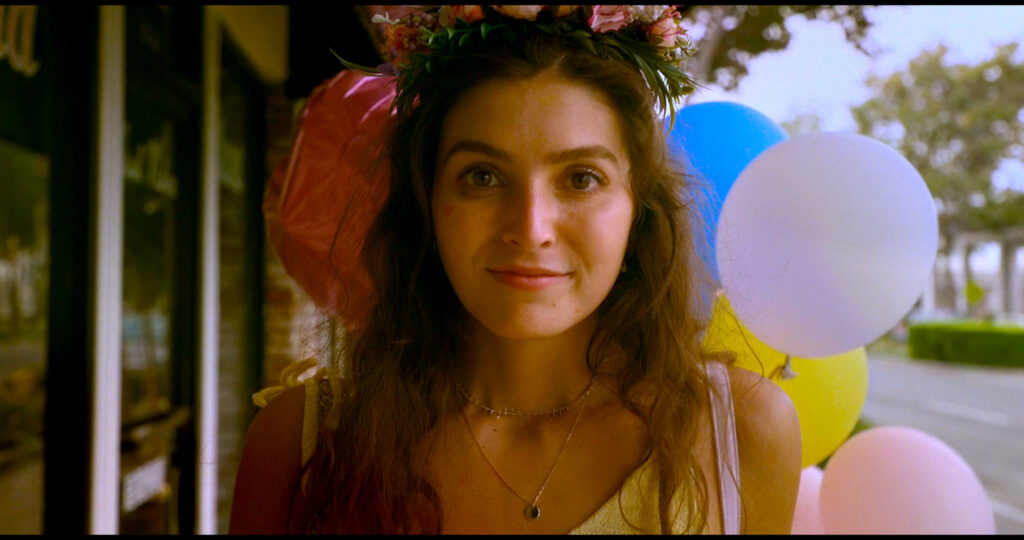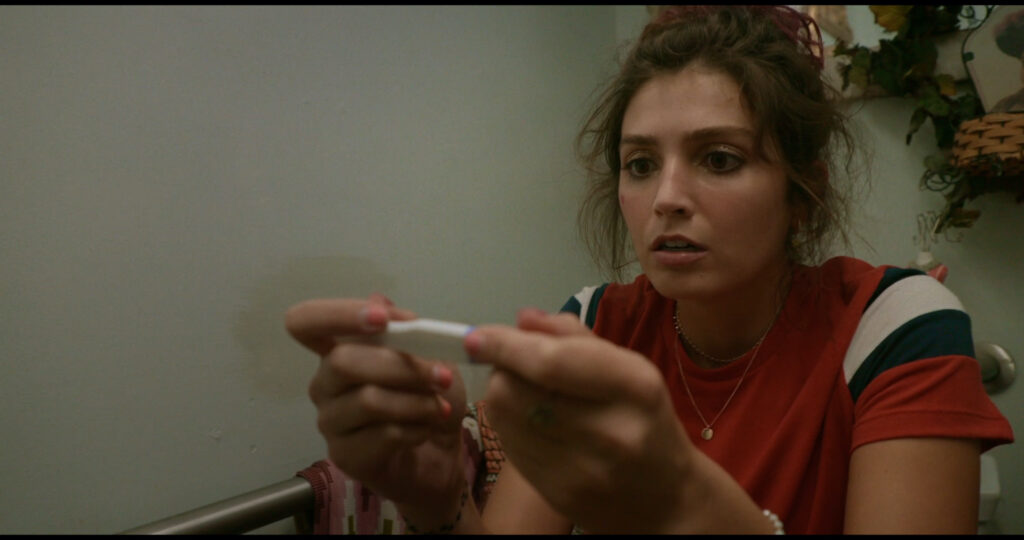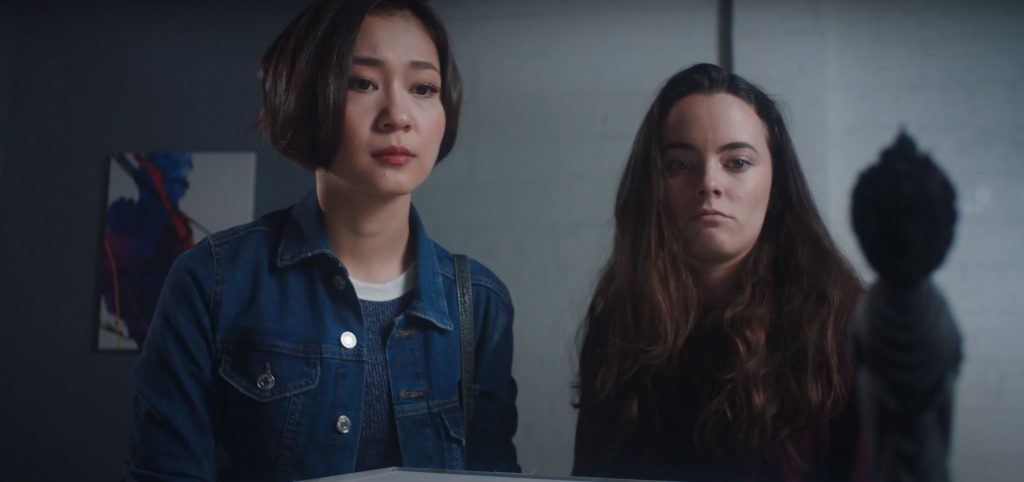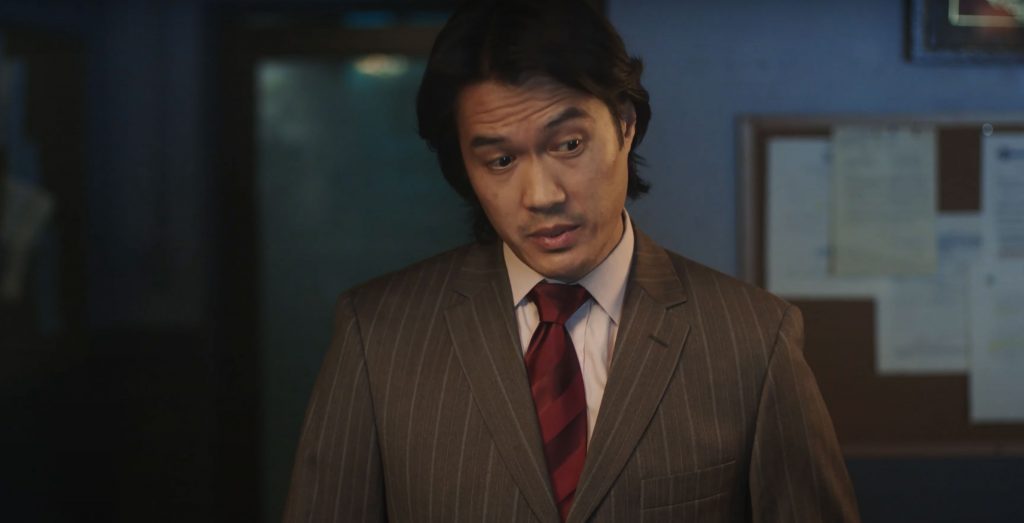June 30, 2022
by Carla Hay

Directed by Sophie Galibert
Culture Representation: Taking place in Los Angeles, the comedy/drama film “Cherry” features a predominantly white cast of characters (with some Latinos and a few African Americans) representing the working-class and middle-class.
Culture Clash: A 25-year-old woman, who is drifting in life and has problems keeping a job, finds out she’s 10 weeks pregnant, and she only has about one day to decide what to do about this unplanned pregnancy.
Culture Audience: “Cherry” will appeal primarily to people interested in an intimate and well-acted portrait about a woman who has to come terms with her views on family planning and what she wants to do with her life.

With a realistic mix of drama and some comedy, “Cherry” presents a memorable portrait of a 25-year-old woman who has just one day to decide what to do about an unplanned pregnancy. As the movie’s title character, Alex Trewhitt gives a captivating performance. “Cherry” tells Cherry’s story without judgment but with plenty of charm and emotional authenticity.
Sophie Galibert directed “Cherry” and co-wrote the movie’s screenplay with Arthur Cohen. “Cherry” had its world premiere at the 2022 Tribeca Film Festival, where it won the Audience Award for Online Premieres, a category of movies that the festival only made available through the festival’s Tribeca at Home online programming. It’s more than a movie about an unplanned pregnancy. It’s also a movie about how this unplanned pregnancy has made Cherry rethink her personal relationships and what she wants to do with her life.
The beginning of the movie, which takes place in Los Angeles, shows Cherry roller skating around the city in a seemingly carefree way. At this point, Cherry doesn’t know yet how much her life will soon change within a few hours. Cherry isn’t roller skating just for fun. She’s financially broke and doesn’t have a car. Roller skating is the cheapest form of transportation that she currently has.
Early in the movie, Cherry is shown going to her job at a place called the Polka Dots Costume Shop, where she works part-time as a sales clerk. Some of her work at this costume shop also includes doing magic tricks for customers and occasionally handing out balloons. Her boss Roger (played by Joe Sachem), who owns and manages the store, is usually easygoing. But on this day when she arrives at work, he tells Cherry that’s he’s had enough of her chronic tardiness. “One more fuck-up, and you’re done,” Roger warns.
It’s the first sign in the movie that Cherry has a tendency to be flaky and irresponsible. Conversations that happen later in the story reveal that Cherry has a long history of drifting from job to job. She also does not have any life goals or plans. However, she has to think about what direction her life will take when she goes into the store’s restroom to take a pregnancy test. It’s how she finds out that she’s pregnant. Cherry doesn’t have much time to let this revelation sink in because she has to start her work shift.
Outside the store, Cherry is doing some store promotion for people passing by on the street. She does some magic tricks and balloon designs, in a way that that’s similar to what a hired clown would do at a children’s party. Two people who stop by are a preoccupied-looking woman (played by Samantha Barrios) and her son, who’s looks to be about 8 or 9 years old.
The woman asks Cherry to entertain her son while she quickly goes in the store. Cherry makes a balloon gift for the boy. Cherry says the balloon is supposed to be a make-believe sword, but it looks a lot like a penis. The boy notices it too and runs into the store with the balloon to tell his mother, who gets very upset. Roger fires Cherry immediately.
With no job and still reeling from the shock of finding out that she’s pregnant, Cherry (who does not have any health insurance) goes to a local health clinic to get another pregnancy test done. It’s a Saturday, which is a day when the clinic will see people by appointment only. Cherry shows up as the clinic is about to close, but through some persistence and begging, she’s able to see a doctor without an appointment.
The only doctor who’s on duty at the clinic is Dr. Amalia Garcia-Ortega (played by Sandy Duarte), who is, just by coincidence, about eight or nine months pregnant. After Cherry takes another pregnancy test, Dr. Garcia-Ortega (who is compassionate and patient) confirms that Cherry is pregnant. The doctor also tells Cherry that Cherry is 10 weeks into her pregnancy and will soon reach 11 weeks. How soon? In a few days.
In California, abortion is legal up to 24 weeks of pregnancy. But because Cherry doesn’t have health insurance, her options on where to get an abortion are limited. She will most likely have to rely on a low-cost clinic, such as the one she’s at now. Dr. Garcia-Ortega does not tell Cherry what to do about the pregnancy.
Instead, the doctor gives Cherry all of the options and tells Cherry that it will be Cherry’s choice on what to do. If Cherry chooses to terminate the pregnancy, the clinic offers a lower price ($500) if the abortion is up to the 11th week of pregnancy. Any abortion between the 11th and 24th week of pregnancy will cost more money than Cherry can afford.
While Cherry is absorbing this information, she asks to have an ultrasound, so that she can see and hear what’s inside her uterus. This ultrasound seems to have an impact on Cherry, as if she’s shaken by the reality that she has a tremendous decision to make. The rest of “Cherry” is about her making this very important decision that could change her life. The clinic is closed on Sundays, and will re-open on Monday, which Dr. Garcia-Ortega says will be the last day before Cherry is technically 11 weeks pregnant.
The father of the child is Cherry’s live-in boyfriend Nick (played by Dan Schultz), who is a musician in a band and a part-time event DJ. Some of his DJ work is at a local roller skating rink where Cherry likes to hang out. It’s never stated exactly how long Cherry and Nick have been together, but some of the movie’s conversations hint that Cherry and Nick have been a couple for less than a year.
Cherry and Nick live in a three-bedroom apartment with “four guys who smoke a lot of pot,” according to a comment that Cherry makes. If Cherry chooses to have this child, she doesn’t want to raise a child in this environment. Nick’s father was an aspiring musician who gave up his music career to raise a family. It’s something that’s brought up in the conversation when Nick finds out that Cherry is pregnant.
The movie never shows Cherry in the place where she lives. Instead, she goes to several other places during the 24-hour period when she makes her decision. When she tells Nick that she’s pregnant, it’s while he’s at a roller skating rink during his shift as a DJ. His reaction might or might not influence Cherry’s decision.
Cherry also visits some other people who have had an impact on her life, including a group of about four or five women called the L.A. Roller Girls, who are hired for events and have big plans to tour. Cherry used to be a member of this group but stopped going to L.A. Roller Girls rehearsals. She hasn’t recently stayed in touch with the group’s members, so they assume that she lost interest in the L.A. Roller Girls.
Ironically, the Sunday that Cherry has to make her big decision is on Mother’s Day. An enlightening part of the movie is when Cherry has a Mother’s Day brunch with her older sister Anna (played by Hannah Alline) and their divorced mother Carla (played by Angela Nicholas), who is worried about Cherry having such an aimless life. This scene with the Mother’s Day brunch gives a lot of insight into the dynamics of Cherry’s family.
Anna, who is a trial attorney, is married and has been unsuccessfully trying with her husband Jeffrey (who’s not in the movie) to get pregnant. Carla and her ex-husband Bob (played by Charlie S. Jensen) have been divorced for years, but the pain of the divorce still lingers. It’s eventually revealed that although Bob was a good provider for the family, Cherry thinks that Bob wasn’t emotionally available as a family man, and it bothers Cherry that he doesn’t call her. It might or might not explain why Cherry seems unable to commit to anything, but it definitely shows she has some “daddy issues.”
To a lesser degree, Cherry is also insecure about Anna being considered the overachieving “golden child” of the family, while Cherry thinks she’s perceived as the unreliable screw-up of the family. Through bits and pieces of conversations during this Mother’s Day brunch, it’s revealed that Cherry has often received financial help from her mother Carla, who has gotten tired of Cherry being so indecisive about what Cherry wants to do with her life.
Later, in one of the movie’s best scenes, Cherry meets her father in the parking lot of an casual snack eatery. In the parking lot is a cherry red Volkswagen that’s owned by Cherry’s maternal grandmother, but Cherry sometimes borrows the car. The car has a dead battery, so Cherry has called Bob (who works as a security guard) to meet her in the parking lot while he’s on a lunch break, so that he can bring his car to give a battery jumpstart. Their conversation is realistically awkward, but it has an emotional resonance that is subtle yet impactful.
Throughout the movie, Trewhitt gives an immensely authentic portrayal of someone who suddenly has to make a momentous, life-changing decision. In movies where the protagonist has an unplanned pregnancy, there are usually a lot of melodramatic scenes or panicking, but Cherry is dealing with this decision in a way that doesn’t involve her breaking down in hysterics. She begins to understand she has the responsibility of making a decision that could affect her life in the long-term, when she has gotten accustomed to living her life “in the moment” and not thinking too much about her future.
“Cherry” also has incisive observations about how people often make parenting decisions based on how they were raised as children. A lot of Cherry’s fears and insecurities about being a “responsible” adult could be linked back to feeling like her life was shaken up because of her parents’ divorce. Children of divorce often have “abandonment” issues, especially if one of the divorced parents is more involved in raising a child than the other divorced parent.
What’s also effective about this movie is that it doesn’t present Cherry as a stereotypical plucky young heroine who’s supposed to be adored by everyone watching the movie. She has a friendly personality, but she’s the type of person who is unreliable and seems to want to avoid growing up. That doesn’t make her a bad person. It makes her a person who’s been indecisive and noncommittal about a lot things in her life. And she can’t be that way for this big decision about her pregnancy.
Through her conversations and interactions in the 24-hour period that she makes her big decision, Cherry starts to see how some of her own flaws and commitment-phobic ways have affected her relationships. Cherry has some resentment toward her father for not being the type of parent she wanted. However, she goes through some of her own self-analysis about how she might have let down people in her life too. Not everything is said out loud from the movie’s screenplay, which is why Trewhitt’s performance is stellar at conveying Cherry’s inner emotions and personal evaluation of her life.
A lot of movies about unplanned pregnancies want to make the subject matter sad and depressing, while other movies with the same subject matter want to turn the unplanned pregnancy into a comedic plot device. And other movies have an agenda to preach what decision should be made about an unplanned pregnancy. “Cherry” does none of that. Instead, this movie poignantly shows how in one 24-hour period, a woman’s decision about a pregnancy has made her re-evaluate her life and perhaps use that self-reflection to make changes for the better.
UPDATE: Entertainment Squad will release “Cherry” in select U.S. cinemas on April 14, 2023. The movie will be released on digital and VOD on April 21, 2023.


